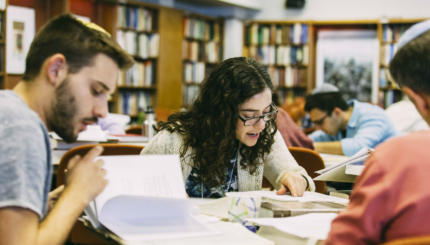Responsa are the answers given by authorities in Jewish law to questions put to them (in Hebrew sheelot u-teshuvot, ‘questions and answers’).
From the Geonic Period
There are occasional references in the to letters sent by one Rabbi to another asking for information in matters of law but the Responsa activity proper dates from the period of the Geonim, when the practice developed of scholars addressing questions to the heads of the great Babylonian communities at Sura and Pumbedita in Babylonia, the foremost authorities in this period.
Collections were made of the Geonic Responsa, especially those of Sherira Gaon and his son Hai Gaon, but while these collections were known to the medieval authorities they did not appear in print until as late as the nineteenth century.
Essentially, the questions in the Responsa concern problems which arose out of new conditions, for which no direct answers could be found in the Talmud, the final authority for Jewish law. The leading Respondents through the ages, faced with new questions, tried to discover analogies in the Talmud and the later Codes and from time to time the replies in the Responsa served as sources for new Codes.

Help us keep Jewish knowledge accessible to millions of people around the world.
Your donation to My Jewish Learning fuels endless journeys of Jewish discovery. With your help, My Jewish Learning can continue to provide nonstop opportunities for learning, connection and growth.
Making Sense of New Realities
Two examples, among many, can be given of how the process works. When printing was invented, the question arose of whether it should be considered as writing for the purposes of Jewish law. Was a printed bill of divorce (get) valid, since the Talmud speaks of a written document? Do printed copies of the Bible enjoy the same sanctity as a band written text?
Since printing was unknown in Talmudic times no direct guidance on these questions could be forthcoming from the Talmud. The Respondents had to arrive at their rulings by careful study of the Talmudic definition of ‘writing’.
Similarly, when electricity was discovered and harnessed to human needs, the question arose of whether switching on an electric light constitutes making fire and is therefore forbidden on the Sabbath. This, too, was considered by the Respondents by an examination of the Talmudic definition of making fire.
In addition to their importance for Jewish law, the Responsa collections (of which around two thousand have now been published) are not only important for Jewish law but serve historians as a rich source for the study of the social life of Jews reflected in them–a particularly reliable source since the details are mentioned in an incidental manner.
Among questions to which contemporary Respondents address themselves are: artificial insemination; riding in an automobile on the Sabbath; autopsies; heart transplants; and switching off a life-supporting machine.
It has to be appreciated that Respondents were not appointed by any kind of official body. A Rabbi was qualified to act as a Respondent simply because his peers looked upon him as a reliable authority. Needless to say, Respondents often differed in their decisions, so that there are to be found debates between Respondents, often conducted with vehemence: for example, on the question of whether machine manufactured matzah can be used for Passover or whether it must it be baked by hand.
Responsa have been published not only by Orthodox Rabbis but also by Conservative and Reform Rabbis whose Responsa reflect their particular philosophy.
Reprinted from The Jewish Religion: A Companion, published by Oxford University Press.



